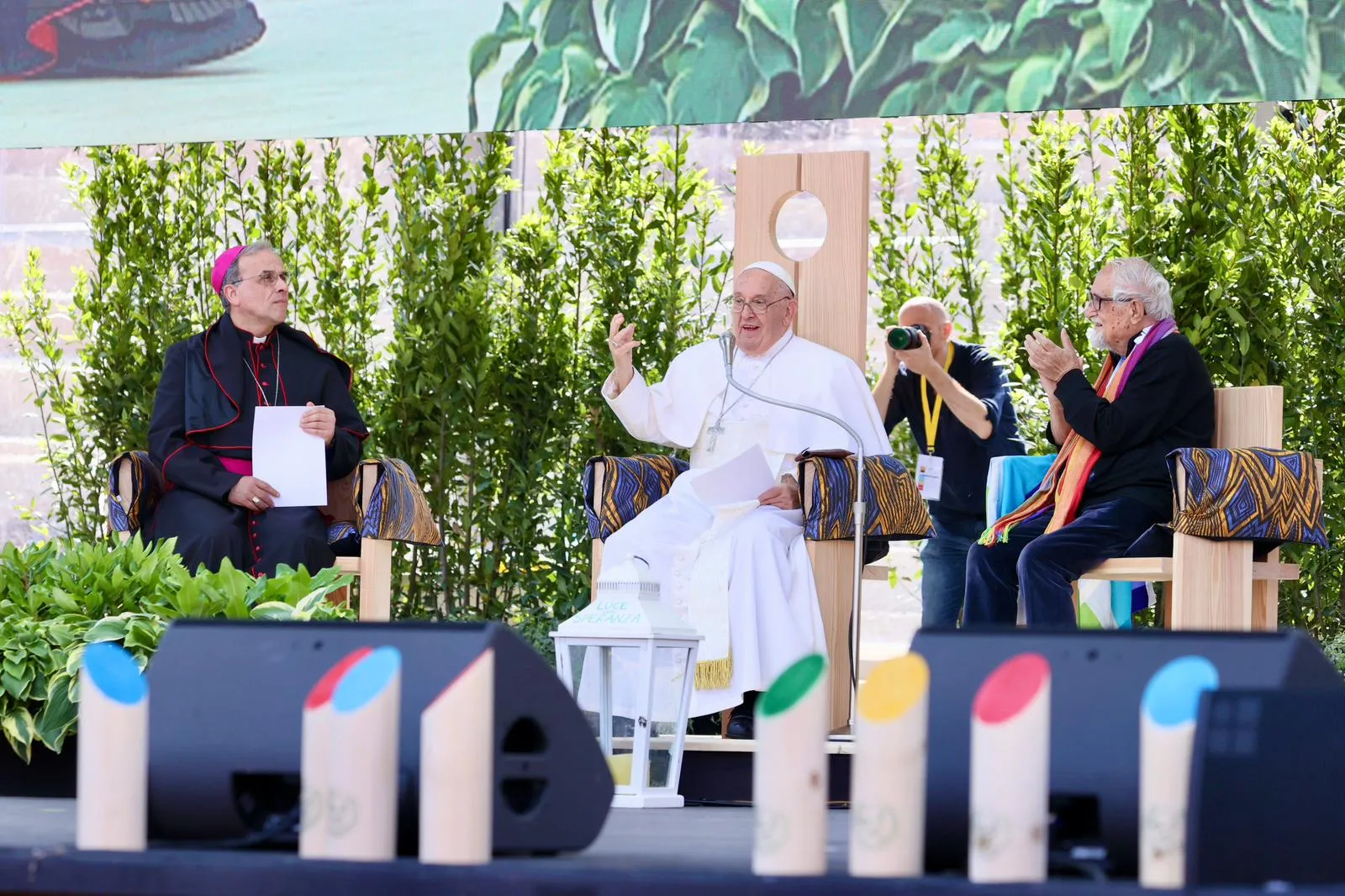
Pope Francis’s one-day pastoral visit to the northern Italian city of Verona on Saturday centered on a message of peace, offering an alternative to the current social paradigm. While the city is home to just over 250,000 residents, the pope’s message was global in scope.
“Peace will never be the result of mistrust, of walls, of weapons pointed at each other,” the pope said at the end of his address at the “Justice and Peace They Shall Kiss” meeting held at the Verona Arena.
“Everyone will reap what they sow,” he e said, quoting from St. Paul’s Letter to the Galatians. “Let’s not sow death, destruction, fear. Let's sow hope!
“This is what you are doing too, in this Arena of Peace. Don't stop. Don't be discouraged. Do not become spectators of the so-called `inevitable' war.’”
The apex of the event came when the pope embraced Maoz Inon, an Israeli whose parents were killed in Hamas’ Oct. 7 attack, and Aziz Sarah, a Palestinian, whose brother was killed in the war.
Calling them “brothers,” Francis proceeded to hug each, calling the embrace “a project for the future.” This was met by a thunderous standing vocation, but followed by a moment of silence for the victims of the war.
The Holy Father arrived in Verona by helicopter at 8 a.m., at the Bentegodi Stadium, and was greeted by the Bishop of Verona, Domenico Pompili, the president of the Veneto Region Luca Zaia, as well as the prefect and mayor of the city.
The first encounter of the day was in the Romanesque Basilica of San Zeno, where the pope addressed priests and consecrated religious. Speaking on the importance of their vocation, Francis reminded them that it is predicated upon “the audacity of testimony” and “the joy of an active faith in charity, the resourcefulness of a Church that knows how to grasp the signs of our time and respond to the needs of those who struggle most.”
“At the origin of consecrated life and priestly life,” the pontiff added, “there is not us, our gifts or some special merit, but there is the surprising call of the Lord, his merciful gaze that bent over us and chose us to this ministry, although we are no better than others, we are sinners like others.”
After the address, Pope Francis made his way into the adjacent piazza, brimming with over 5,000 people, where he was warmly greeted by children and young people.
In a brief question-and-answer exchange with three different children, the Holy Father highlighted the importance of the day’s overarching theme of peace.
“There are many wars, many wars, both in Ukraine and in the Holy Land, in Africa, in Myanmar... Many, many wars,” the pope said.
“Does Jesus preach war or peace?,” the pope asked the children. Answering in a booming and unified voice they shouted: “peace!”
After his address to the young people, Pope Francis arrived at Verona’s first-century Roman amphitheater after 10 a.m and was greeted with a standing ovation by the over 10,000 spectators in attendance.
Much like the arena itself, the event was rich in symbolism, reflecting the overarching themes of justice, peace, and social inclusion.
Pope Francis took his place at the center of the stage and sat in a high-back wooden armchair — constructed by inmates — responding to a series of questions on ecology, migration, and just economic development, all of which were subsumed under the urgent call for peace.
Responding to a question, fielded by an Afghani woman, on how to make peace work, the pope warned against a culture “marked by individualism,” as this runs the risk of “making the dimension of the community disappear.”“The dimension of the community disappears, the dimension of the vital bonds that support us and make us advance. And it inevitably also produces consequences on the way in which authority is understood.”
“And this,” the pontiff continued, “is perhaps the root of dictatorships.”
The Holy Father proceeded to the next event, a meeting with the inmates at Verona’s Montorio prison where he expressed his closeness and reminded them: “God forgives everything and he always forgives.”
The pope also addressed the conditions of the prison, one of the most overcrowded in Italy, and expressed his “pain” that some inmates have committed suicide.
“Life is always worth living, always,” the pope declared.
“Our existence,” he continued “is a unique gift for us and
for others, for everyone, and above all for God, who never abandons us,
and who actually knows how to listen, rejoice and cry with us, and
always forgive.”
